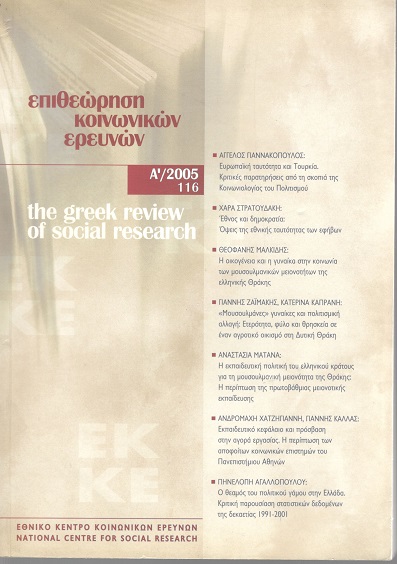Ο θεσμός του πολιτικού γάμου στην Ελλάδα. Κριτική παρουσίαση στατιστικών δεδομένων της δεκαετίας 1991-2001
Abstract
Στην πρώτη ενότητα του άρθρου γίνεται ιστορική αναδρομή στο θεσμό του πολιτικού γάμου στην Ελλάδα, συγκριτική επισκόπηση των ισχυόντων σε άλλες χώρες, παρουσίαση των κύριων χαρακτηριστικών του διαζευκτικού συστήματος που ισχύει στην Ελλάδα από το 1982 και τέλος διατυπώνονται κριτικές παρατηρήσεις. Στη δεύτερη ενότητα του άρθρου γίνεται κριτική παρουσίαση στατιστικών δεδομένων. Καταλήγουμε πως η πλειονότητα των Ελλήνων δεν επιλέγει τον πολιτικό γάμο, γιατί προσηλωμένοι οι Έλληνες στις παραδόσεις προτιμούν την τέλεση θρησκευτικού γάμου. Είναι όμως αξιοσημείωτο ότι κατά τη διάρκεια της δεκαετίας 1991-2001 υπήρξε μία συνεχής αύξηση του ποσοστού των τελεσθέντων πολιτικών γάμων.
Article Details
- How to Cite
-
Αγαλλοπούλου Π. (2016). Ο θεσμός του πολιτικού γάμου στην Ελλάδα. Κριτική παρουσίαση στατιστικών δεδομένων της δεκαετίας 1991-2001. The Greek Review of Social Research, 116, 167–188. https://doi.org/10.12681/grsr.9479
- Issue
- 2005: 116 Α΄
- Section
- Articles

This work is licensed under a Creative Commons Attribution-NonCommercial 4.0 International License.
Authors who publish with this journal agree to the following terms:
- Authors retain copyright and grant the journal right of first publication with the work simultaneously licensed under a Creative Commons Attribution Non-Commercial License that allows others to share the work with an acknowledgement of the work's authorship and initial publication in this journal.
- Authors are able to enter into separate, additional contractual arrangements for the non-exclusive distribution of the journal's published version of the work (e.g. post it to an institutional repository or publish it in a book), with an acknowledgement of its initial publication in this journal.
- Authors are permitted and encouraged to post their work online (preferably in institutional repositories or on their website) prior to and during the submission process, as it can lead to productive exchanges, as well as earlier and greater citation of published work (See The Effect of Open Access).



